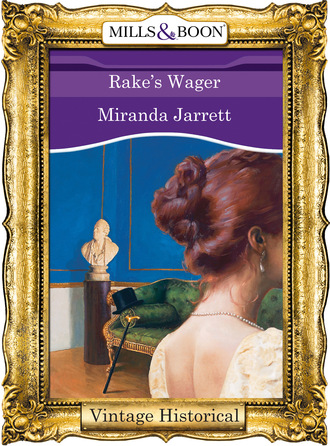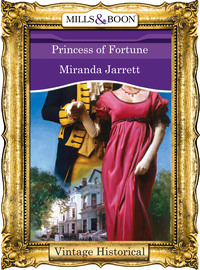
Полная версия
Rake's Wager

Praise for bestselling author
Miranda Jarrett
“Miranda Jarrett continues to reign as the queen of historical romance.”
—Romantic Times
“A marvelous author…each word is a treasure, each book a lasting memory.”
—The Literary Times
“Ms. Jarrett always delivers a memorable story peopled with memorable characters…. You can always count on Ms. Jarrett to gift us with something intelligent, new and vibrant.”
—Romantic Times
Acclaim for Miranda Jarrett’s previous titles
The Golden Lord
“Sexual tension runs high. There are…secrets to be kept, mysteries to be solved and a traditional ending in which sharing truth wins true love.”
—Romantic Times
The Silver Lord
“The characters and plotting are very good and deftly presented.”
—Affaire de Coeur
The Very Daring Duchess
“A vibrant, passionate story, richly told. The Very Daring Duchess will sweep you away to an eighteenth century world of power and danger.”
—USA TODAY bestselling author Jo Beverley
The Captain’s Bride
“Deliciously entertaining, Miranda Jarrett’s The Captain’s Bride blends a swift, rollicking romance between two unlikely characters with a richly textured understanding of the seafaring life.”
—New York Times bestselling author Mary Jo Putney
Star Bright
“Ms. Jarrett’s ability to always draw the reader into a fast-paced tale peopled with likable and realistic characters and a thrilling plot is a crowning achievement.”
—Romantic Times
Rake’s Wager
Miranda Jarrett

www.millsandboon.co.uk
MILLS & BOON
Before you start reading, why not sign up?
Thank you for downloading this Mills & Boon book. If you want to hear about exclusive discounts, special offers and competitions, sign up to our email newsletter today!
SIGN ME UP!
Or simply visit
signup.millsandboon.co.uk
Mills & Boon emails are completely free to receive and you can unsubscribe at any time via the link in any email we send you.
Contents
Chapter One
Chapter Two
Chapter Three
Chapter Four
Chapter Five
Chapter Six
Chapter Seven
Chapter Eight
Chapter Nine
Chapter Ten
Chapter Eleven
Chapter Twelve
Chapter Thirteen
Chapter Fourteen
Chapter Fifteen
Epilogue
Chapter One
Woodbury, Sussex, England
1806
C assia Penny sat with her spine pressed tight against the ladder-back chair, her fingers squeezing her handkerchief into a soggy linen knot in her lap. The cheap black bombazine for grieving cut into her throat and wrists, the cloth so hot and wrong on this early spring day that she could feel the sweat inside her gown trickling down her arms and between her breasts and along the backs of her knees above her garters. Though she kept her head high like her two sisters on either side of her were doing, her eyes burned from weeping, and it would take next to nothing to make her cry again.
She was only twenty, yet she felt as if part of her life had died, too. Nothing would ever be the same again, not for any of them.
Mr. Grosse, the solicitor, sat at her father’s now empty desk, using one finger to square the stacked papers of the will into tidy precision.
“I regret to say that your lives must change, ladies.” He heaved a mournful sigh appropriate for the day. “Though that should come as no real surprise, considering your father’s vocation.”
“We know our father was a country vicar, Mr. Grosse,” Amariah said, each word clipped sharp, the way they always were whenever anyone dared cross Cassia’s eldest sister. “We are humbled and awed by the legacy which he has left behind on this earth, and the reward that is certainly now his in heaven.”
Unimpressed, Mr. Grosse looked at her over his glasses. “Alas, Miss Amariah, such good works accumulate little interest in the bank, and your father’s generosity made it impossible for him to save.”
“Father was a kind, good, fine gentleman, Mr. Grosse,” Cassia protested, rising to her feet, “and I—we—won’t hear you say otherwise!”
At once Bethany’s hand found Cassia’s arm, gently pressing her back into her chair. “Mr. Grosse is only stating the truth, Cassia. Father never did worry about acquiring worldly goods, just as we never expected him to leave much of an estate.”
“But we never expected him to die this soon, either.” Cassia sank back into her seat, once again fighting back her tears. Father had been only forty-five; who would have guessed that so great a heart would stop so suddenly, there while he pulled the first spring weeds in the kitchen garden?
“That is why we’ve already begun to plan our future, Cassia.” Amariah’s smile was sad, true, but also filled with a confidence that Cassia couldn’t share. “Father always trusted us to find our way through life, and we shall.”
“You’ll have to find it away from this cottage, Miss Amariah.” Mr. Grosse sighed again. “Sir Cleveland has already informed me that the new vicar will be arriving shortly. He will wish to reside here, as is due with his living. Sir Cleveland regrets the seeming haste of your eviction, but he—”
“He says he is most concerned for the spiritual needs of the congregation.” Again Cassia sniffed back her tears. “And he is most concerned, too, for that nephew of his who’s always wished to take poor Father’s place, the greedy piglet!”
“Cassia.” From Amariah that was warning enough. “Such talk does not honor Father’s memory.”
Hastily Cassia looked down to her lap, knowing that Amariah was right, the way she always was. It didn’t matter that this rambling cottage with its rose garden and duck pond had been the only home that any of them had known, or that they now must part and leave it forever. She needed to be strong and brave like her sisters, and look toward the future, not the past.
Even if she’d no idea what or where that future might be.
Mr. Grosse glanced around the library, noting the crates and trunks that were already swallowing up Father’s books and belongings. “Have you made provisions to remove your things and reside with another family member or friend?”
Bethany smiled serenely. “God helps those who help themselves, Mr. Grosse. Father shared his love of accomplishment and knowledge with us, and we intend to use those gifts to support ourselves.”
Mr. Grosse looked relieved to be spared the guilt of shoving the dead vicar’s daughters into the lane. “You have made plans, then?”
Amariah nodded, all brisk efficiency despite her new mourning. “I am considering an offer from Mr. and Mrs. Whiteside to serve as governess to their daughters at Rushington.”
“And Lady Elverston has invited me to be her special companion at Elverston Hall.” Bethany clasped her hands before her with becoming modesty, as if she couldn’t believe her good fortune. “She most kindly recalled both my play upon the pianoforte and the little suppers I’d arrange for Father and his friends, and she believes such talents would do well at Elverston.”
“How excellent,” Mr. Grosse said with approval. “And you, Miss Cassia? Have you determined your future?”
Cassia’s head bowed a little lower. She wasn’t accomplished the way that Amariah and Bethany were. The things she did best—dressing bonnets and remaking gowns into cunning new fashions, or arranging the Yule greenery in the church to look like a magical Sherwood Forest, or telling silly stories that made the young gentlemen laugh and cluster around her and beg for dances at the Havertown Assembly each month—were not the things that could earn her way in the world, at least not as an honest young lady of good reputation, as the Penny sisters had of course been raised to be.
But it had been more than enough while Father still lived, when she’d been his little popinjay and made him laugh until the tears had streamed down his cheeks when he should have been writing his sermons….
“Cassia will find something soon enough, I am sure,” Amariah said quickly, answering for her. “It is early days for us all, Mr. Grosse.”
“Indeed, indeed.” Mr. Grosse frowned down at the papers before him. “But I do have a certain revelation to make that might ease the immediacy of your situation. To be sure, it may not be the most welcome news, reflecting as it does upon your father’s integrity. But then we can keep everything within this room, among us and no further.”
Her heart beating faster at the thought of more bad news, Cassia inched forward to the edge of her chair. “A revelation, sir? About Father?”
“Yes, Miss Cassia.” He turned to another sheet. “Your father wanted this kept separate from the rest of the will, but I assure you that the inheritance is perfectly legal nonetheless.”
He cleared his throat, looking from one sister to the next. “Long, long ago, a grateful and repentant member of your father’s flock left your father his greatest single possession…a private, ah, social club in London.”
“A social club?” Cassia shook her head. “Father never cared for Society. What would he do with a social club?”
Mr. Grosse cleared his throat with a delicate, embarrassed cough. “There is little society at a London social club, Miss Cassia. That is the polite name. The other one for such a place is a—forgive me, pray—a gambling hell.”
“Father?”
“Yes.” Hastily Mr. Grosse looked back down at his papers. “But while most men would have sold such a dubious bequest, your father saw it as a gift from heaven, a way for him to make right from wrong. He allowed the house’s activities to continue, contributing all the profits to the welfare of orphans and widows, particularly those who had come to sorrow from gambling.”
Cassia pressed her fingers to her mouth. As worldly as Father was about some matters, he’d never countenanced any form of wagers or other games of risk and chance. Yet now it seemed that in London he’d owned an entire house devoted to exactly that. How ever had he kept such a secret for so long?
“Father owned a private gaming club, Mr. Grosse?” Amariah’s brows arched with disbelief. “In London? Our father?”
“I am afraid so, Miss Amariah.” Mr. Grosse shook his head. “I know such news much come as a great shock, after what—”
“Is this gaming club in a prosperous neighborhood?” Bethany asked. “If this is true, then Father must have viewed his involvement as being a latter-day Robin Hood—that he would take from the rich to help those less fortunate. I cannot imagine him doing it otherwise.”
Mr. Grossed glanced down, shuffling through the papers. “I believe the club is in St. James Street, a thoroughly respectable address for such a, ah, such a business. Its name is Whitaker’s, though who Mr. Whitaker is or was seems long forgotten. Oh, here we are—a view of the club from the street.”
He pushed an engraving across the desk toward them, and Amariah took it, tipping the sheet so her sisters could see as well.
“It’s quite a handsome facade, isn’t it?” Cassia volunteered, not quite sure what else to say. Accustomed as she was to how the vicarage nestled into the green Sussex hills, this town house seemed as welcoming as a cold block of ice, locked tight between its neighbors. The walls appeared to be stone, three floors high, and the tall, square windows without shutters made the front seem even more severe. A solitary gentleman in an old-fashioned cocked hat pointed his walking stick at the unwelcoming entry, four shallow steps and a plain front door.
“It is handsome,” agreed Mr. Grosse. “And from what I can gather, Whitaker’s was once a favorite of gentlemen of the highest quarter of society, even peers of the realm and officers of the Crown.”
Amariah looked up from the illustration. “But it is no longer?”
Mr. Grosse shrugged, hedging. “Not what it once was, no. As an absentee owner, your father let it deteriorate a bit over time. But the property itself is still sound, and finding a buyer should prove no difficulty, at a price that shall allay much of your current distress.”
“But were those Father’s wishes, Mr. Grosse?” Cassia asked, still looking at the grim stone house in the picture. “Did he wish us to sell this—this property of his, or were we to continue to let it do his good works?”
“Yes, Mr. Grosse, you must tell us that.” Now Bethany was perched on the very edge of her chair, and Cassia wondered if she, too, was daring to think the same thing. “‘Balancing the scales of our modern society’ was a favorite theme of his for sermons. If he had been granted such an excellent vehicle for balancing those scales, I scarcely think he’d want us to abandon it now.”
“Yes, yes,” Amariah said. “And if the neighborhood is as respectable as you say, we could reside there ourselves, too, and be self-sufficient. Surely Father would wish that for us, too. Oh, yes, Mr. Grosse, we must consider this from every angle.”
“I cannot say I agree.” Mr. Grosse frowned and shook his head, scattering a fine dust from his gray-powdered wig. “It is unusual enough for a country vicar to pursue such an endeavor, Miss Amariah, but for three virtuous young ladies to continue in such a role, to choose to live above such a den of despair and depravity—why, such a thing is not to be done, and I should counsel you most strongly against it.”
“Is it outside the law, Mr. Grosse?” Cassia asked. The town house in the picture wasn’t close to being her idea of a home, but surely she and her sisters together could make it into one. “Are women forbidden ownership of such clubs?”
“There is no legal reason against it, no, but for the sake of propriety, such an arrangement would be most irregular, most—”
“Is there more you are not telling us, Mr. Grosse?” Amariah ran her fingers lightly across the illustration, as if touching it would make it more real. “Is the house being used for other, more disreputable activities?”
“Good gracious, no, Miss Amariah!” The solicitor’s face flushed a shocked purple at her suggestion. “Gaming is all—and disreputable enough for a lady such as yourself!”
“The world can be disreputable, Mr. Grosse, even for ladies.” Amariah rose, shaking out her black skirts, and Cassia and Bethany quickly followed. “Would you please excuse us for a few minutes, Mr. Grosse?”
Grumbling to himself, Mr. Grosse had no choice but to leave them, turning his eyes toward the heavens with a hearty sigh as he shut the door.
“Well, now.” Amariah sat in a muted rush of bombazine. “I cannot tell if Father has left us a prize, or only a puzzle.”
“A prize—a great prize!” Cassia paced back and forth across the carpet, unable to keep the enthusiasm from her voice. “He has given us not only a way to support ourselves, but also a way to continue his work! And think of living in London, the greatest city in the world!”
“What I’m thinking, Cassia, is how very much we must learn.” Amariah held up her hand, ticking off each ignorance on a new finger. “We have only visited London a few times, and know nothing of the city or its workings. We have no friends there, no one to turn to for advice or answers. We wouldn’t even know where to find a butcher or mantua maker. And we haven’t the faintest notion of how a gaming club such as this Whitaker’s operates, or how it generates its money.”
“We could learn, Amariah.” Bethany smiled eagerly. “We are not fools.”
Amariah glared at her for interrupting. “But we could turn into the greatest fools imaginable with this, Bethany. We don’t know the managers of this club, or whether Father’s trust in their abilities is well-founded. Even Mr. Grosse admitted that the club was no longer as profitable as it had been.”
Cassia swept her hand through the air as if to sweep away her sister’s objections, too. “Then we shall hire people who can improve it!”
“Where would we find such people, Cassia?” Amariah raised her hands. “Why, we don’t even know how to play the wicked games that would be supporting us and Father’s charities!”
“We can learn,” Cassia insisted. “Think of all the things that Father taught us, Latin and Greek and geography and mathematics and all the rest that girls weren’t supposed to be able to understand. We thought he was teasing when he’d said that knowledge would be our dowries, but perhaps he wasn’t teasing at all.”
Amariah looked back at the paper in her hands and frowned. “This would be vastly different from translating The Iliad for Father.”
“It would, and it wouldn’t,” Cassia said. “Consider how quick you are at ciphering and figuring numbers in your head. I’m certain you could learn the games and oversee the accounts.”
Bethany nodded, tapping her fingers on the arm of the chair with excitement. “From what I have read in the London papers, much of the success of catering to gentlemen is to give them a grand and comfortable place for their mischief. They can gamble anywhere, but they would return to our club if the food and drink are better than anywhere else.”
“Which it would be, Bethany, if you were overseeing the kitchen,” Cassia said, giving an excited little clap of her hands. “None of those fou-fou Frenchmen in Elverston’s kitchen can hold a candle to your cooking, and you know it.”
Amariah sighed—not exactly with resignation, not yet, but close. “And what role have you cut out for yourself, Cassia?”
Cassia raised her chin and smiled. She wasn’t nearly as useless as she’d feared at first. She’d only had to find her place.
“I would make the club beyond fashion,” she declared. “I would make it so original a place that everyone who wasn’t there would give their eyeteeth to be able to say they were. It wouldn’t be a hell once we’d done with it. “
“Cassia.” Amariah groaned. “And who knows more about setting the London fashion than three vicars’ daughters from Woodbury?”
“Three handsome daughters,” Cassia said, and as if on cue the three of them glanced across the room to the round looking glass over the fireplace. Even in mourning, with their eyes red from weeping and their copper-colored hair drawn severely back from their faces, they were a striking trio: Amariah the eldest and tallest, with the bearing of a duchess; sweet-faced Bethany in the middle; and Cassia herself, Father’s little popinjay, with her round cheeks and startled blue eyes.
“You can’t pretend we’re not handsome,” Cassia continued, “because we are, or at least handsome enough, thanks to us all having Father’s red hair with Mama’s face. Everyone says so. Wouldn’t we make you curious if you were a bored London beau?”
“Flirting with the squire’s sons at the Havertown Assembly isn’t the same as matching wits with London rakes,” Amariah said. “We could be terribly at sea, Cassia, and not in a good way, either.”
“Then the more proper we are, Amariah,” Cassia said, dipping her skirts in an excruciatingly correct curtsey, “the more mysterious and exotic we’ll seem to them, on account of being proper in a wicked world. And we could change the name, too, to make it our own. We could call it Penny House.”
“Penny House!” Bethany exclaimed with relish. “Oh, Cassia, I do like that!”
Amariah set the picture of the club back down on the desk, and pressed her palms to her cheeks.
“I cannot believe we are having such a conversation with poor Father scarcely gone,” she said softly. “London, and a gaming house named after ourselves, and whether to flirt or not with wicked men—oh, what would Father say to that?”
“He—he would call us his flock of silly geese,” Cassia said, her voice squeaking with a fresh rush of emotion. “And then he would tell us to go do what we believed was right and just, the way he would do for himself. The way he always did.”
Bethany came and stood between them, slipping her hands into theirs. Together they stared solemnly down at the picture of Whitaker’s, sitting on Father’s desk.
“We would be together in London,” Cassia said. “We wouldn’t have to go different ways. Father would have liked that, too.”
Bethany nodded. “If we go there and find that London doesn’t suit us, then we can still sell, as Mr. Grosse wishes.”
“But it will suit us,” Cassia said quickly. “And if it doesn’t, we’ll make it suit us.”
“Of course we will, Cassia, just like that. All London will bow at the feet of the Penny sisters.” Amariah sighed. “You know, I never did want to look after those dreadful Whiteside girls.”
Bethany looked up, her eyes bright with triumph. “And I do believe Lady Elverson will survive without hearing me play for her each night.”
Cassia gasped, not quite believing her sisters had agreed. “Then we will go? We’ll take Father’s legacy, and make it our own?”
“To London.” Finally Amariah smiled, and nodded. “It seems that, in his way, that is what Father wished us to do.”
“To London!” Cassia crowed, and raised their joined hands together. “To London, and to Penny House!”
Chapter Two
Four months later
London
R ichard Blackley leaned closer to the painting, inspecting the surface for cracks to better judge its age. He didn’t give a fig whether the painting was two hundred years old, or two weeks, nor would he recognize the difference, except for how high the auctioneer might try to run the bidding. He glanced back at the listing in the exhibition catalog: The Fortune Teller, Italian, Sixteenth Century.
That made him smile. The smirking old woman was a bawd if ever he’d seen one, taking the last coin that poor sot in the foreground had in his pocket, while he was busy gaping at the strumpet in the scarlet turban at the window. It was the strumpet he liked best, with her sloe-eyed, sleepy glance and creamy bare breasts. He knew just the place for her, in his dressing room at Greenwood, where she’d amuse him while he was shaved.
He drew a small star before the picture’s number in the catalog. Generally he didn’t care one way or the other about pictures, but this was one he didn’t want to let slip away. What was the use of being a rich man if he couldn’t buy himself a painting that made him smile?
“Excuse me, sir.” A young woman had eased her way through the crowd of other viewers here for the exhibition before the auction, and she now stood squeezed between Richard and the painting—his painting. “I didn’t mean to bump you.”
“Forgiven,” he said, lifting his hat to her as he smiled. It was easy to smile at her: she was a pretty little creature, with bright blue eyes and golden-red hair that her plain dark mourning bonnet seemed to highlight rather than mask. Whom did she grieve for, he wondered idly: a husband, parent, sibling? “Though to be honest, I hadn’t noticed that you’d bumped me at all.”
“Well, sir, I did,” she said, “so of course I had to apologize, to make things right. It would be rude of me not to.”
She stated it as simple fact, a fact that he wasn’t sure how to answer, but because she was such a pretty little creature, he wanted to. She wasn’t being forward, the way a demirep might be to attract his notice; in fact, if Richard was honest, she didn’t really seem interested in him at all. Instead her whole attention seemed focused on the painting before him, and to his dismay she was marking a circle around the same number in her catalog as he had in his.
“You are bidding on this picture, miss?” he asked. “You like it that much?”
“That is the reason one usually comes here to Christie’s Auction Rooms, isn’t it? To bid on the pictures one likes?” She darkened the circle around the listing for emphasis. “Last week I sold three dreary paintings of peasants with cows, and now I plan to reward myself by buying this one.”





